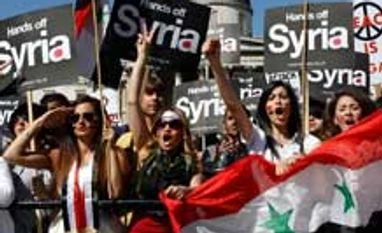President Barack Obama on Tuesday said he would "absolutely" put on hold a possible US-led military attack on Syria if it places its chemical weapons arsenal under international control, even as Russia was in talks with Damascus to draw a "concrete plan" on the issue.
Hours after Obama said that he was looking skeptically, but seriously at a Russian offer to push the Bashar al-Assad regime to put its chemical weapons arsenal under international control, Moscow announced it was holding talks with Damascus to formulate a "workable, precise and concrete" plan for the smooth transfer of the deadly weapons.
"We (Russia) are currently working on preparing a workable, precise and concrete plan and for this there are literally right now, in these minutes, contacts with the Syrian side," Russian Foreign Minister Sergei Lavrov said.
Earlier in interviews to six American news channels, Obama said, "If Syrian President gives up his chemical weapons, a military strike would absolutely be on pause."
He called the Russian proposal a "potentially significant breakthrough."
"Absolutely, if, in fact, that happened," the President said when asked if the military strike was on pause if Assad yields control of his chemical weapons to international authority.
"That's in our national security interest. If we can do that without a military strike, that is overwhelmingly my preference. And now the key is, can we see a sense of urgency?" Obama told ABC News.
Asserting that he always preferred a diplomatic resolution to the Syrian crisis, Obama said, "I fervently hope that this can be resolved in a non-military way."
Obama, unsure of getting enough Congressional support on Syria, said he would take a final decision after talking to American people directly.
According a media report, Obama could fall short of 50 votes needed to get Senate authorisation for a military strike against Syria for its alleged use of chemical weapons against its own people.
The US had alleged that sarin - a deadly nerve agent - was used by the Assad regime on August 21 that left at least 1,429 civilians, including over 400 children, dead.
The Syrian government denied the charge, saying rebels had used the deadly gas to defame it.
Hours after Obama said that he was looking skeptically, but seriously at a Russian offer to push the Bashar al-Assad regime to put its chemical weapons arsenal under international control, Moscow announced it was holding talks with Damascus to formulate a "workable, precise and concrete" plan for the smooth transfer of the deadly weapons.
"We (Russia) are currently working on preparing a workable, precise and concrete plan and for this there are literally right now, in these minutes, contacts with the Syrian side," Russian Foreign Minister Sergei Lavrov said.
More From This Section
"And we expect to present this plan soon and we will be ready to work on it with the UN secretary general, the Organisation for the Prohibition of Chemical Weapons, with the participation of members of the UN Security Council," he said.
Earlier in interviews to six American news channels, Obama said, "If Syrian President gives up his chemical weapons, a military strike would absolutely be on pause."
He called the Russian proposal a "potentially significant breakthrough."
"Absolutely, if, in fact, that happened," the President said when asked if the military strike was on pause if Assad yields control of his chemical weapons to international authority.
"That's in our national security interest. If we can do that without a military strike, that is overwhelmingly my preference. And now the key is, can we see a sense of urgency?" Obama told ABC News.
Asserting that he always preferred a diplomatic resolution to the Syrian crisis, Obama said, "I fervently hope that this can be resolved in a non-military way."
Obama, unsure of getting enough Congressional support on Syria, said he would take a final decision after talking to American people directly.
According a media report, Obama could fall short of 50 votes needed to get Senate authorisation for a military strike against Syria for its alleged use of chemical weapons against its own people.
The US had alleged that sarin - a deadly nerve agent - was used by the Assad regime on August 21 that left at least 1,429 civilians, including over 400 children, dead.
The Syrian government denied the charge, saying rebels had used the deadly gas to defame it.
)